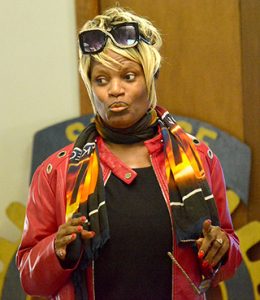
By Stan Schwartz
“There have always been groups of people who for one reason or another are not appreciated to the extent that the world needs to appreciate them,” said Julie Leverenz during last week’s Bowling Green Rotary Club meeting.
Whether it is women fighting to get the right to vote, as Genevive Clark did in the 1920s or people who have been discriminated against because of their culture or the color of their skin, there have always been groups of people who are marginalized, she said.
Because of this, she noted, when she was district governor for Rotary, they spent a lot of time on the topic to come up with a program to help people see beyond their own groups.
“We have framed it as ‘Diversity, Inclusion, Belonging, Empathy—#DIBEs,” Leverenz said. “Belonging is what touched me,” she added, “because we all want to be appreciated. We are all unique and so different is so many ways.” Because Rotary is a microcosim of the world, the groups are open to welcoming more individuals into their clubs who are different that those already in the club.
With that in mind, Leverenz introduced the guest speaker, Jennifer Williams and her husband, Andre. Jennifer was picked to lead the way on speaking with Rotary groups to show all the clubs how to be more thoughtful when seeking out new members.
Jennifer, who founded JWI Partners group, traveled to Bowling Green from her Rotary Club in Florissant, Mo., to present the recently developed DIBEs program.
When she first joined Rotary in 2022, Jennifer said her friends questioned her about it, believing the group was part of he Ku Klux Klan. She has worked with Monsanto and Master Card on diversity programs and thought she could more by becoming part of Rotary and all that the clubs do to help their communities and others throughout the world.
“I am so passionate about diversity,” she said. She worked with these big companies on the issue of retaining top talent employees no matter what their gender or ethnicity.
So, when she joined Rotary, she jumped in with both feet to see how she could move this initiative forward.
“When companies disregard diversity, inclusion, belonging and empathy,” she said, what outcomes might they encounter, she asked. Engaging the members, they said the companies could lose market share, they lose innovation, new ideas, and those employees.
“We miss the diverse perspective, and we limit creativity and innovation,” Jennifer said. “If we don’t embrace (DIBEs) in our clubs,” she added, “we lose the diverse perspective.” Without these groups, we lose that creativity and innovation.
“We need people who look different than us to be part of our club,” she said.
She had the members break into three groups to discuss what could be done to increase diversity within the club, which would then spill over into their everyday lives, both personal and work.
DIBEs, she explained, ties into Rotary’s Four-Way Test, something the groups recite at the end of each meeting—“Of the things we say and do: Is it the Truth, Is it Fair to All Concerned, Will it Build Goodwill and Better Friendships, Will it be Beneficial to All Concerned.”
She asked the groups would it be beneficial to all concerned if the clubs had greater diversity, inclusion, belonging and empathy?
Without DIBEs, the groups noted, clubs could limit their creativity and innovation.
Leverenz said one of the biggest challenges is in social-economic status. Life is difficult for those who are just barely scraping by.
“Poverty is such a pervasive challenge,” she said.
With other people’s experiences, said Milan Berry, you will have a better understanding of their lives, and there is so much to learn from other groups.
Stephen Hunter said by including others, each group could grow and develop new networks of friends.
Kevin Brown said DIBEs would help groups break out of their usual way of doing things, and that in itself would help groups grow.
Jennifer challenged the Bowling Green Rotary Club to find ways to include more diverse people.



